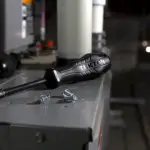
If you’ve just bought a house and everything seems to be going wrong you must be feeling despondent.
So what should you do if you just bought a house and everything is going wrong? If you’ve just bought a house and everything is going wrong it may be a case of “Caveat Emptor” or “Buyer Beware“. It’s likely to be simply a part of owning your own house. But you may have recourse to the surveyor or the vendor depending on what’s gone wrong and what survey, if any, you had.
What is Caveat Emptor ‘buyer beware’?
Caveat emptor is a Latin term that means “let the buyer beware.” This is similar to the phrase often used if you buy a second hand car, which is “sold as seen.”
All these terms mean that the buyer assumes the risk. It means the buyer accepts the house may fail to meet expectations or may have defects. Which is why a survey is worth the investment.
If you are a first time buyer this might be a reality check
I’m sorry to have to tell you this, but if this is your first house it may be a reality check. Whereas before you didn’t have to pay for anything except for rent and utilities. Or you paid nothing as you lived with your parents before buying your first house. But now you will have to pay for everything that goes wrong.
When you rent a home you are only responsible for paying rent and utilities. When you live with your parents you have no responsibility for anything. Some parents ask for rent.
However, once you buy a house, this completely changes. You are now responsible for everything. If anything breaks or fails you have to pay. If your roof springs a leak the cost of repair is yours. This is slightly different if you own a flat, as the general repairs are covered by the service charge.
However, if the roof springs a leak due to storm damage your insurance should cover the cost of repairs. But this would only be the case if you have insurance cover. Although if you have a mortgage on your property the mortgage lender will insist on insurance cover.
What can go wrong that you could have recourse to the vendor
There are very few things that can go wrong where you’ll be able to go back to the vendor. This is especially true if for example appliances breakdown like ovens, hobs, dishwashers, fridges and washing machines. Even surveyors don’t check appliances.
What if you bought a house with problems not disclosed
However, if the vendor has lied on the Seller’s Questionnaire, there may be comeback. For example, it might be that something goes wrong with the electrics and the vendor failed to disclose works had been done and these were the cause. In this case you may be able to go back to the seller. But you will need to discuss this with your solicitor.
If you can prove there is an undisclosed problem, you may be able to sue the seller. However, you would have to prove the seller was aware of the problem you’ve uncovered. This might include Japanese Knotweed or structural defects or damp problems.
But this is why you should pay for a survey. Surveys should pick up damp and structural defects. Unless these have been cleverly disguised somehow. As for Japanese Knotweed, it is possible this could be hidden and not picked up in the survey. If it can be proven that the seller knew about these problems and disguised the fact, you could sue them for damages.
Buying a used house is like buying a used car without any warranty
If any of the appliances are included in the sale, you are taking the risk these may not work or may fail. They make breakdown between between when you agreed to buy the house and when you complete.
The owner is under no obligation to tell you that any of the appliances included in the sale have failed. Bear in mind these are second hand goods. Which means they won’t come with a warranty.
The vendor is unlikely to provide a warranty on anything in the house. Think about it this way, if you bought a second-hand appliance on eBay or Gumtree from a person, you accept it’s second-hand and you’d be taking the risk. This is no different when you’re buying a house.
What if you bought house and the oven is not working?
If you bought a house and the oven is not working this is a case of “Buyer Beware“. The cost of repair or replacement will be down to you and not something you could get from the seller. The same applies to an oven whether it’s integrated or not.
It might be nice if the seller were to tell you its broken or to fix it beforehand. But they are not obliged to do so.
What can go wrong that you could have recourse to the surveyor
Firstly, it will depend on the type of survey you had (see below for what’s checked and covered in survey). Secondly, it also depends on whether the surveyor caveated their report. For example, they often caveat underfloor joists. Usually they are not able to lift the floorboards, as these are often under carpet or heavy furniture.
If it turns out the joists are rotten and the surveyor hadn’t picked these up, but they were not able to see these, and so long as they’ve caveated this fact, you are unlikely to have any recourse to the surveyor.
However, if the surveyor negligently missed the fact that the house had subsidence or damp (which is unlikely), you would have recourse to the surveyor in this case. You can then claim on their professional indemnity insurance.
But if the things that are going wrong include kitchen appliances or toilets and such like, these go wrong all the time. Appliances are not checked by any of the survey types listed in the table below. Plus even if the toilet did flush at the time of the survey, these can go wrong over time. It might be the toilets were checked, but have failed since.
Get homecare cover in place to insure against heating systems going wrong
It might be that a number of things have already gone wrong. But you may be best advised to insure against other things that can go wrong. For example, you might be advised to insure against your heating, electrics and plumbing and drains going wrong.
For a modest monthly payment you can insure for the cost of these going wrong. Which means that if your boiler breaks down, the heating engineer’s cost to fix it will be covered.
How to best avoid buying a house where everything goes wrong
If you have already bought your house where everything is going wrong, this part of the article comes a little late. But having said that, use what’s gone wrong as a learning experience.
Everyone makes mistakes and should learn from them. But actually, it may be you haven’t made a mistake as such, it may be purely down to bad luck. So learn from what’s gone wrong and use what’s in this article to take forward to your next house purchase.
What to do to avoid buying a house where everything goes wrong:
- Have a survey done on the house. Below is a table that shows what you can check yourself (assuming you know what you are doing). But it also shows what a surveyor checks when they look at a property too. You’ll see that depending on the survey type, will depend on what’s checked. If you feel really burned by this experience, you may opt for a full RICS building survey in future. That’s assuming that what’s gone wrong would be covered.
- Have a buffer when you first move in. If you accept that things can and will go wrong with your new house, you should set money aside to fix these. Owning a house means you take responsibility for everything that can and may go wrong.
- Get home care cover for heating, electrics and drains. On all my properties I have taken out a home care package to cover against breakdowns of the heating system, electrical problems and problems with the plumbing and drains. This provides peace of mind should anything go wrong.
- Visit the house pre-exchange. I always recommend you carry out a pre-exchange visit. This is especially the case if there’s been a severe storm. You want to have a final check that all is okay before you are committed to the purchase. You might want to take a read of this article about whether you should view a property again before exchange.
- Ask for an electrical survey. Not all vendors will agree to having an electrical survey done. However, if you are prepared to pay for it there’s no reason why they should refuse. It would be down to how you haggle with the vendors should anything be found to be wrong as to who has to pay for any rectification.
What is included in a house survey?
What is included in a house survey does depend on the type of survey you have. In the table below I list all the main aspects you might expect to be covered by the types of house survey. These include a condition report, a homebuyers report and a building survey (or what used to be called a full structural survey).
What is included in a house survey - includes Condition Report, Homebuyer Report and Building Survey
| What can go wrong | Buyer's Own Pre-Exchange Check | Condition Report | Homebuyer Report | Building Survey (Full Structural Survey) |
|---|---|---|---|---|
| Appliances working properly | Yes | No | No | No |
| Heating system working properly | Yes | Visual inspection only | Visual inspection only | Owner or occupier is asked to activate the system to check basic operation |
| Bathroom fittings | Yes | Visual inspection only | Visual inspection only | Visual inspection and toilets are flushed and taps are turned on |
| Damp, including rising damp, penetrating damp and condensation | Yes | Yes | Yes | Yes |
| Conservatory leaks | Visit the house when it's raining to check | Only if there's visible damage or if it's raining on inspection day | Only if there's visible damage or if it's raining on inspection day | Only if there's visible damage or if it's raining on inspection day |
| Roof leaks | Visit the house when it's raining to check | Only if there's visible damage or if it's raining on inspection day | Only if there's visible damage or if it's raining on inspection day | Only if there's visible damage or if it's raining on inspection day |
| Rotting timbers including insect attack | Yes | Yes, but carpets and floor coverings are not lifted | Yes, but carpets and floor coverings are not lifted | Yes, but carpets and floor coverings are not lifted unless the owner agrees |
| Leaking gutters and downpipes | Visit the house when it's raining to check | Only if there's visible damage or if it's raining on inspection day | Only if there's visible damage or if it's raining on inspection day | Only if there's visible damage or if it's raining on inspection day |
| Drains | Yes | No | Neither the drains nor drainage systems are tested | The surveyor will open all reasonably accessible, lightweight inspection chamber covers and attempt to identify the means of foul and surface water disposal |
| Subsidence or structural movement | Yes | Yes | Yes | Yes |
| Blown double glazing | Yes | No | Yes | Yes |
| Outside doors and window opening | Yes | Yes | Yes | Yes |
| Internal doors | Yes | All opened and closed where unlocked and keys are available | All opened and closed where unlocked and keys are available | All opened and closed where unlocked and keys are available |
| Boundary walls and fences | Yes | Visually inspected | Visually inspected | Visually inspected |
| Roof coverings | Yes | Visually inspected | Visually inspected | Visually inspected |
| Chimney | Yes | Visually inspected | Visually inspected | Visually inspected |
| Main walls | Yes | Visually inspected | Visually inspected | Visually inspected |
| Built-in fittings opened including kitchens, bathrooms and wardrobes (but not appliances) | Yes | Yes | Yes | Yes |
| Septic tank | Yes | No | No | Will identify any illegal connections to septic tanks and should be visually inspected |
| Vermin like rats and bats | Yes | Visual inspection of loft | Visual inspection of loft | Visual inspection of loft |
| Lights and extractor fans | Yes | No | No | Yes |
| Ceilings | Yes | Visually inspected from floor level | Visually inspected from floor level | Visually inspected from floor level and are gently pressure tested for underlying defects |
| Floors | Yes | Surfaces of exposed floors are visually inspected | Surfaces of exposed floors are visually inspected | The surface of floors not covered with fixed floor coverings and subfloor areas are inspected as far as practicable |
| Japanese Knotweed | Yes | Yes | Yes | Yes |
Are these signs you bought the wrong house?
When everything is going wrong you may think these are signs you bought the wrong house. But if you step back and ask yourself why you liked the house enough to buy it in the first place you may realise you are just reacting badly to all the things that a going wrong.
In a few months time when everything has been fixed. When you’re settled in you’ll probably find you’ll no longer feel like you’ve bought the wrong house.
In conclusion if you’ve just bought a house and everything is going wrong
Whilst it may be tough if you’ve just bought a house and everything is going wrong, reflect on the fact that the only reason that is the case is because you own the house. The responsibility of owning a house goes hand-in-hand with the upkeep of the property. Responsibility is good.
If you are a first time buyer, this article is definitely worth a read, especially if you’re freaking out buying your first house.
I hope you’ve got something from reading this article about just bought a house and everything is going wrong
If you’ve got something from this article about “just bought a house and everything is going wrong” please share it on your favourite social media site.
Also, if you have any questions, please feel free to comment below too. Alternatively, if you need more help, please feel free to contact us on our contact us page here. Or join the discussion and ask your question in the property forum.




